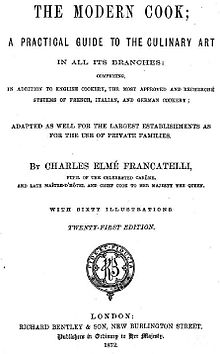The Modern Cook

Title page of 21st edition
|
|
| Author | Charles Elmé Francatelli |
|---|---|
| Illustrator | 60 engravings, artists not named |
| Country | England |
| Subject | Professional cooking |
| Publisher | Richard Bentley & Son |
|
Publication date
|
1846 |
| Pages | 560 (1886 ed.) |
The Modern Cook was the first cookery book by the Anglo-Italian cook Charles Elmé Francatelli (1805–1876). It was first published in 1846. It was popular for half a century in the Victorian era, running through 29 London editions by 1896. It was also published in America.
The book offered elaborate dishes, described with French terminology such as bisque, entrées, entremets, vol-au-vent, timbale and soufflé. It included bills of fare for meals for up to 300 people, and for a series of eight- or nine-course dinners served to Queen Victoria; one exceptional royal dinner in 1841 had sixteen entrées and sixteen entremets, including truffles in Champagne.
The Modern Cook was the first to mention filling wafer cones with ice cream. The book, written for upper middle-class housewives, is illustrated with 60 engravings, often showing how to present carefully-decorated centrepiece dishes such as "Salmon à la Chambord" for large dinner parties.
The book influenced households in Britain and America to aspire to more complex, French-style dinners in imitation of the Queen, and resulted in a change in eating habits, including the modern two-course approach for both lunch and dinner.
Charles Elmé Francatelli, from an Italian family, was born in London in 1805, and learnt cookery in France. Coming to England, he worked for various aristocrats before becoming chief chef of Crockford's club and then chief cook to Queen Victoria in 1840. He went on to work at Crockford's again, at the Coventry House and Reform Clubs, St James's Hotel, and for the Prince and Princess of Wales. This made him a celebrity cook of his time.
Apart from the preface and Francatelli's advice on serving wine, the body of the book consists almost entirely of recipes without any kind of introduction. There is no guidance on choice of kitchenware or advice on the layout of the kitchen.
...
Wikipedia
